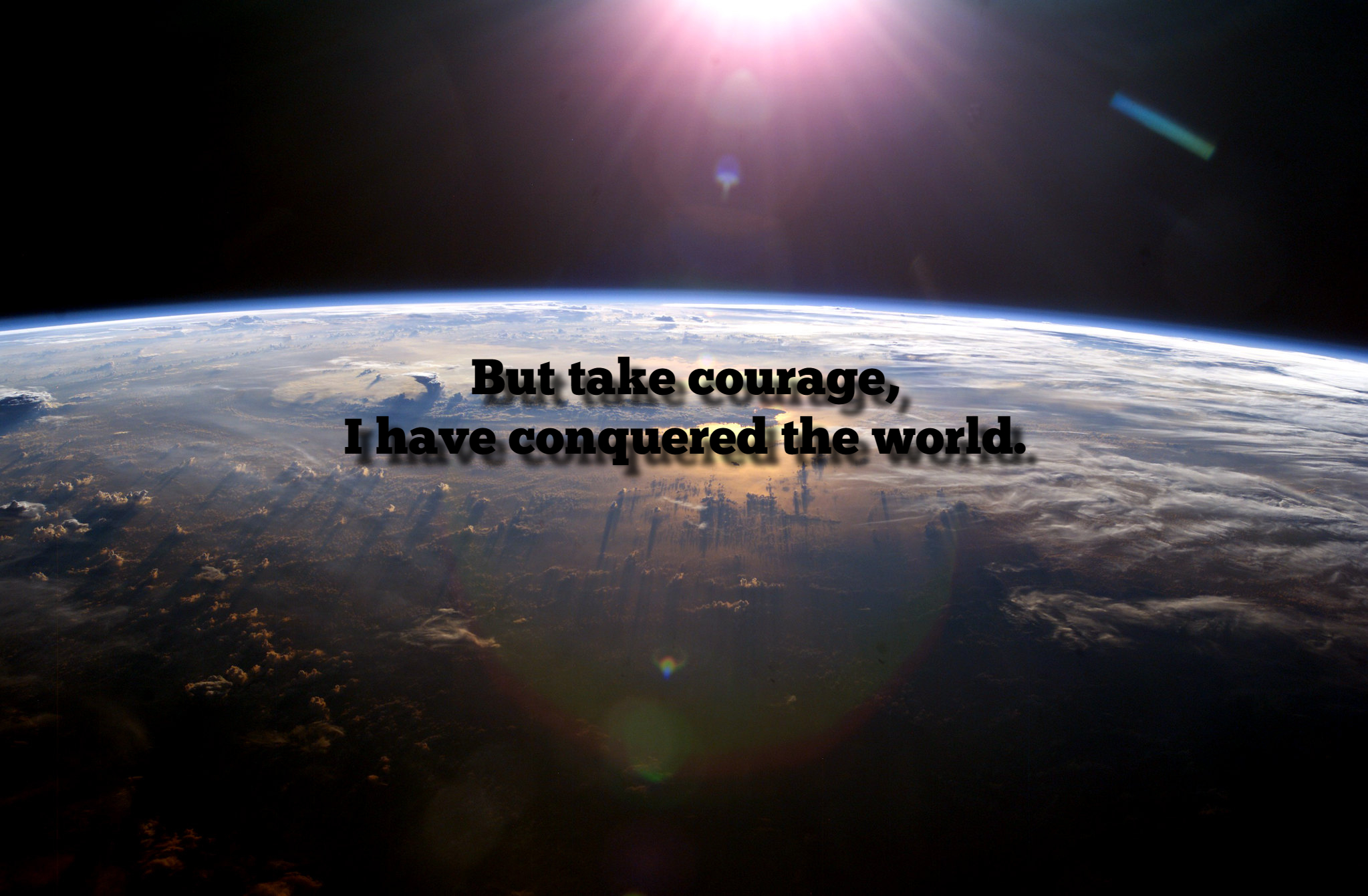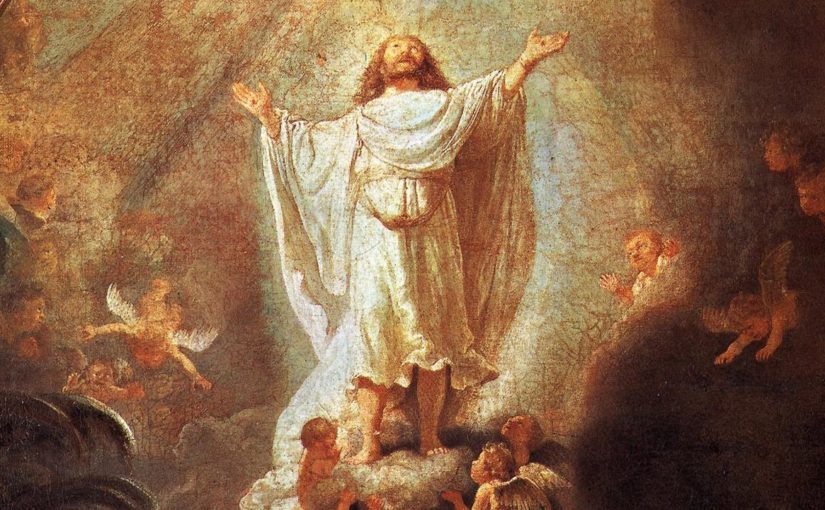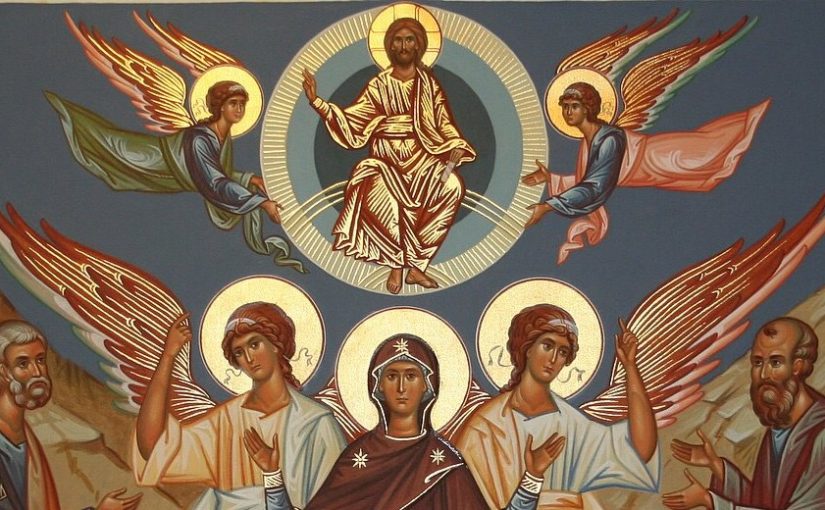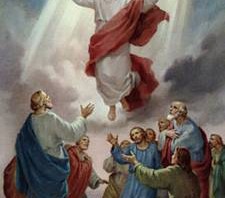Today’s readings
For some reason, whenever I’m in the car with my mother, taking her wherever it is we need to go, we seem to get all the red lights. After we stop for a dozen of them or so, it becomes kind of a joke, and she just laughs and says, “well, it’s because I’m in the car with you!” What makes it so funny is that neither of us is really that good at waiting. But hey, are any of us good at waiting? We are a people who want to get on with it, we don’t like to stand around doing nothing. We want to come to a decision, to make things happen, to get it over with already.
So today’s feast is a little bit of a challenge for us, I think. The Ascension in some ways is the feast of waiting. The disciples in our first reading from Acts want to know if this is it, is Jesus finally going to restore the kingdom to Israel. And this betrays the fact that they’ve gotten it wrong once again. “It is not for you to know the times or seasons that the Father has established by his own authority,” Jesus tells them. They want to know the big picture, to see what’s coming next, and Jesus isn’t going to do that for them. They are just going to have to wait.
Waiting is hard for the Apostles to do. They have fervor having been with Jesus, but they were always getting it wrong. They are looking for the coming of the Messiah. They want Jesus to be the one to restore the kingdom to Israel. They want everything wrapped up, all of their hopes and dreams fulfilled, and they’d like all that to happen now, please. And who can blame them? Don’t we too have these same expectations of Jesus from time to time? Don’t we too want the wars in the world to come to an end and peace to break out all over the globe? Don’t we want to stop experiencing illness, and death and sin? Don’t we want the kingdom to come now, not later, in our lifetime, so we can see it? Who can blame the Apostles for not wanting to wait? We ourselves cannot wait for the fullness of the kingdom to be accomplished.
But they, and we, are told to wait for the coming of the Holy Spirit. Because by themselves, Jesus told them, they can do nothing. It is only with the grace of God, poured out by the Holy Spirit, that anything worthwhile can ever be accomplished. Without the Spirit, those first disciples were always misinterpreting Jesus’ words and actions. Without the Spirit, they scattered at the first sign of trouble. This too, is something we experience. Whenever we attempt to do anything, worthwhile as it may be, without God’s help, we are destined to fail. We might want to better ourselves in some way, by giving up a vice or learning something new, but without God’s grace, it falls flat soon after we resolve to do it. We may want, as our Gospel says, to drive out demons, to speak new languages, to heal the sick. But how do we do that on our own? The answer is, we don’t. We too have to wait for the Holy Spirit.
Waiting is a spiritual discipline that we must all learn. The reasons to develop the habit of waiting are good ones. In waiting, we have that time out that keeps us from doing something wrong. In waiting, we gather better information and think things through before we launch into something the wrong way. In waiting, we are given the gift of the Holy Spirit who leads us in the everlasting way. And that gift of the Spirit is absolutely worth the wait!
So today we stand here with the disciples. There are so many questions to ask. What’s going to happen when? How do we be a Church? What do we need to do to spread the Gospel to every creature on earth? But this isn’t the time to get all the answers. We will have to wait. Because now, our Lord ascends from our sight. In his glorified, resurrected body, he rises to heaven, returning to the Father from whom he came. Will we do the same, returning in our resurrected bodies to the Father? Yes. When will that happen? That’s not for us to know right now. Again, we will have to wait.
And so, with those first disciples, we stand here, peering up into the heavens, waiting for our Jesus to answer all our questions, to bind up all our woundedness, and to bring us all to glory. But we can’t go there just yet. And so, what are we doing standing here looking up into the sky. Jesus will return. We don’t know when; we will just have to wait. But while we are waiting there is much to do.
“Go into the whole world and proclaim the gospel to every creature.” This is important work that has been entrusted to us. Because the consequences are dire: “Whoever believes and is baptized will be saved; whoever does not believe will be condemned.” And this task is given to us disciples. We have to proclaim the gospel in everything that we do. In the words we speak, in our actions and habits, in the love we bring to others – this is how people will hear the gospel. If they don’t hear it in your actions and love, they may never hear it in a homily or sermon. “Preach the gospel at all times,” St. Francis once said, “and when necessary, use words.”
So that’s what we are to do while we are waiting. We have to make sure everyone knows that God loves them enough to send his only Son to be our salvation. Jesus came to earth, taking on our human body, becoming one like us in all things but sin, walked among us and died the same death we all do, paying the price for our sins and obliterating the obstacles of sin and death that kept us from God. People need to know that and if they’re ever going to hear it, they need to hear it in you – in your families, in your workplaces, in your schools, your communities, wherever God puts you. And it is that gift of the Holy Spirit, that gift for which we wait on this Ascension day, that will give you the power to do that convincingly.
These last months have been a difficult time of waiting for me. I had asked the bishop and the personnel board of our diocese for permission to stay at St. Raphael’s another year. Because there is much that still needs to be done. But, this week, I was reminded that I’m not supposed to do it all. I learned that in the week after Father’s Day, I will be transferred to St. Petronille in Glen Ellyn, and that a new priest, a newly ordained priest, would be coming here to St. Raphael. So now the waiting is over, and the moving and the leaving and the saying goodbye has to start. Quite frankly, if there is anything I dislike more than waiting, it’s moving and leaving and saying goodbye. But that’s where life takes us from time to time.
You absolutely have to know that my heart is breaking as I leave here. You have been my family, and you have been the family that has formed me in my first years of priesthood and has made me always want to be a better priest every day. You have loved me into my vocation, and have been shining examples of faith and discipleship for me. You have prayed with me, and worshipped with me, and served with me. You were the ones who helped me through the illness and death of my father in my very first year as a priest. You will always have a special place in my heart, and I will always be grateful for the gift of having been your priest.
I hope that you give those same gifts to the new priest. He will need your love and support. He will need you to challenge and teach him. He will need your prayers. Fr. Ted and I will need your prayers too as we go through this transition. I’ll still be here for a few weeks, so this isn’t goodbye just yet. Instead it is a thank-you. And God bless you for being the people you have been for me.





You must be logged in to post a comment.